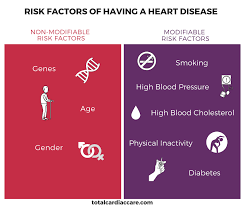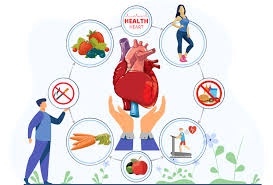
Risk Factors for Developing Heart Diseases

Age
Aging increases your risk of damaged and narrowed arteries and weakened or thickened heart muscle.
Sex
Men are generally at greater risk of heart disease. However, women's risk increases after menopause.
Family History A family history of heart disease increases your risk of coronary artery disease, especially if a parent developed it at an early age (before age 55 for a male relative, such as your brother or father, and 65 for a female relative, such as your mother or sister).
Smoking
Nicotine constricts your blood vessels, and carbon monoxide can damage their inner lining, making them more susceptible to atherosclerosis.
Poor diet
A diet that's high in fat, salt, sugar and cholesterol can contribute to the development of heart disease.
High blood pressure
Uncontrolled high blood pressure can result in hardening and thickening of your arteries, narrowing the vessels through which blood Flows.
High blood cholesterol levels
High levels of cholesterol in your blood can increase the risk of formation of plaques and atherosclerosis.
Diabetes
Diabetes increases your risk of heart disease. Both conditions share similar risk factors, such as obesity and high blood pressure.
Being male
Men have a greater risk of heart attack than women do, and they have attacks earlier in life. Even after menopause, when womens death rate from heart disease increases, it is not as great as mens.
Race
Heart disease risk is higher among African Americans, Mexican Americans, American Indians, native Hawaiians, and some Asian Americans compared to Caucasians.
Excess weight
People who have excess body fat especially if a lot of it is at the waist are more likely to develop heart disease and stroke even if they have no other risk factors.


